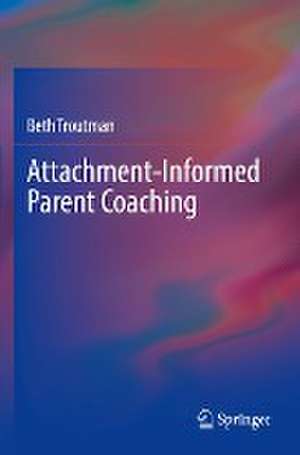Attachment-Informed Parent Coaching
Autor Beth Troutmanen Limba Engleză Paperback – 21 apr 2023
Key areas of coverage include:
- The role of adult attachment in working with young children.
- Addressing secure, ambivalent/resistant, avoidant, disorganized, and controlling child-parent dyads.
- Coaching parents who have a secure, earned secure, preoccupied, dismissing, or unresolved working model of attachment.
- Working with adopted children and children in foster care.
This book is an essential resource for researchers, professors, and graduate students as well as clinicians and professionals in developmental psychology, social work, pediatrics, family studies, nursing, child psychiatry, pediatrics, occupational therapy, and early childhood education.
| Toate formatele și edițiile | Preț | Express |
|---|---|---|
| Paperback (1) | 723.93 lei 6-8 săpt. | |
| Springer International Publishing – 21 apr 2023 | 723.93 lei 6-8 săpt. | |
| Hardback (1) | 729.36 lei 6-8 săpt. | |
| Springer International Publishing – 20 apr 2022 | 729.36 lei 6-8 săpt. |
Preț: 723.93 lei
Preț vechi: 882.85 lei
-18% Nou
Puncte Express: 1086
Preț estimativ în valută:
138.57€ • 150.57$ • 116.47£
138.57€ • 150.57$ • 116.47£
Carte tipărită la comandă
Livrare economică 22 aprilie-06 mai
Preluare comenzi: 021 569.72.76
Specificații
ISBN-13: 9783030985721
ISBN-10: 3030985725
Pagini: 192
Ilustrații: XXI, 192 p. 1 illus.
Dimensiuni: 155 x 235 mm
Greutate: 0.34 kg
Ediția:1st ed. 2022
Editura: Springer International Publishing
Colecția Springer
Locul publicării:Cham, Switzerland
ISBN-10: 3030985725
Pagini: 192
Ilustrații: XXI, 192 p. 1 illus.
Dimensiuni: 155 x 235 mm
Greutate: 0.34 kg
Ediția:1st ed. 2022
Editura: Springer International Publishing
Colecția Springer
Locul publicării:Cham, Switzerland
Cuprins
Chapter 1. Attachment Theory.- Chapter 2. The IoWA-PCIT Model for Working with Parent-Child Dyads.- Chapter 3. Adult Attachment.- Chapter 4. Parent-Child Attachment: Four Examples.- Chapter 5. Working with Secure Parent-Child Dyads.- Chapter 6. Coaching Parents Who Have Secure/Autonomous Working Model of Attachment.- Chapter 7. Working with Ambivalent/Resistant Child-Parent Dyads.- Chapter 8. Coaching Parents Who Have a Preoccupied Working Model of Attachment.- Chapter 9. Working with Avoidant Child-Parent Dyads.- Chapter 10. Coaching Parents who have a Dismissing Working Model of Attachment.- Chapter 11. Working with Disorganized and Controlling Child-Parent Dyads.- Chapter 12. Coaching Parents Who Have Unresolved Attachment.- Chapter 13. Working with Adopted Children and Children in Foster Care.- Chapter 14. Coaching Parents of Adopted Children and Children in Foster Care.- Chapter 15. Learning and Growing as Therapists: Recognizing Our Own Working Model of Attachment.-Chapter 16. Dancing Toward Security.
Notă biografică
Beth Troutman, Ph.D., ABPP, is a Clinical Professor of Psychiatry at the University of Iowa Carver College of Medicine. Her teaching, research, and clinical work has focused on improving parent-child interactions for more than 40 years. She has wide knowledge of different early childhood theoretical models and has identified the core components of each to create a unique model and approach. She currently conducts research and training on her integrative model, Integration of Working Models of Attachment into Parent-Child Interaction Therapy (IoWA-PCIT).
Textul de pe ultima copertă
This book examines attachment-informed parent coaching to address emotional and behavioral problems of young children. The volume summarizes relevant developmental and attachment theory research and describes how it supports an attachment-informed parent coaching approach. The book addresses the challenges of parenting young children with disruptive behavior or who are emotionally reactive, and how mental health providers can help parents address these challenges. Chapters describe how therapists can use their observations of parents and children interacting to tailor parent coaching according to different child and adult attachment patterns. It discusses the important role of adult attachment in tailoring parent coaching, including an understanding of how the therapist’s working model of attachment influences their work with families. Each chapter includes information on current research as well as rich examples of how this research can inform clinical practice.
Key areas of coverage include:
This book is an essential resource for researchers, professors, and graduate students as well as clinicians and professionals in developmental psychology, social work, pediatrics, family studies, nursing, child psychiatry, pediatrics, occupational therapy, and early childhood education.
Key areas of coverage include:
- The role of adult attachment in working with young children.
- Addressing secure, ambivalent/resistant, avoidant, disorganized, and controlling child-parent dyads.
- Coaching parents who have a secure, earned secure, preoccupied, dismissing, or unresolved working model of attachment.
- Working with adopted children and children in foster care.
This book is an essential resource for researchers, professors, and graduate students as well as clinicians and professionals in developmental psychology, social work, pediatrics, family studies, nursing, child psychiatry, pediatrics, occupational therapy, and early childhood education.
Caracteristici
Examines attachment-informed parent coaching to address emotional and behavioral problems of young children Synthesizes positive psychology and attachment theory research, detailing attachment-informed parent coaching Addresses the challenges of parenting young children with disruptive behavior or who are emotionally reactive
